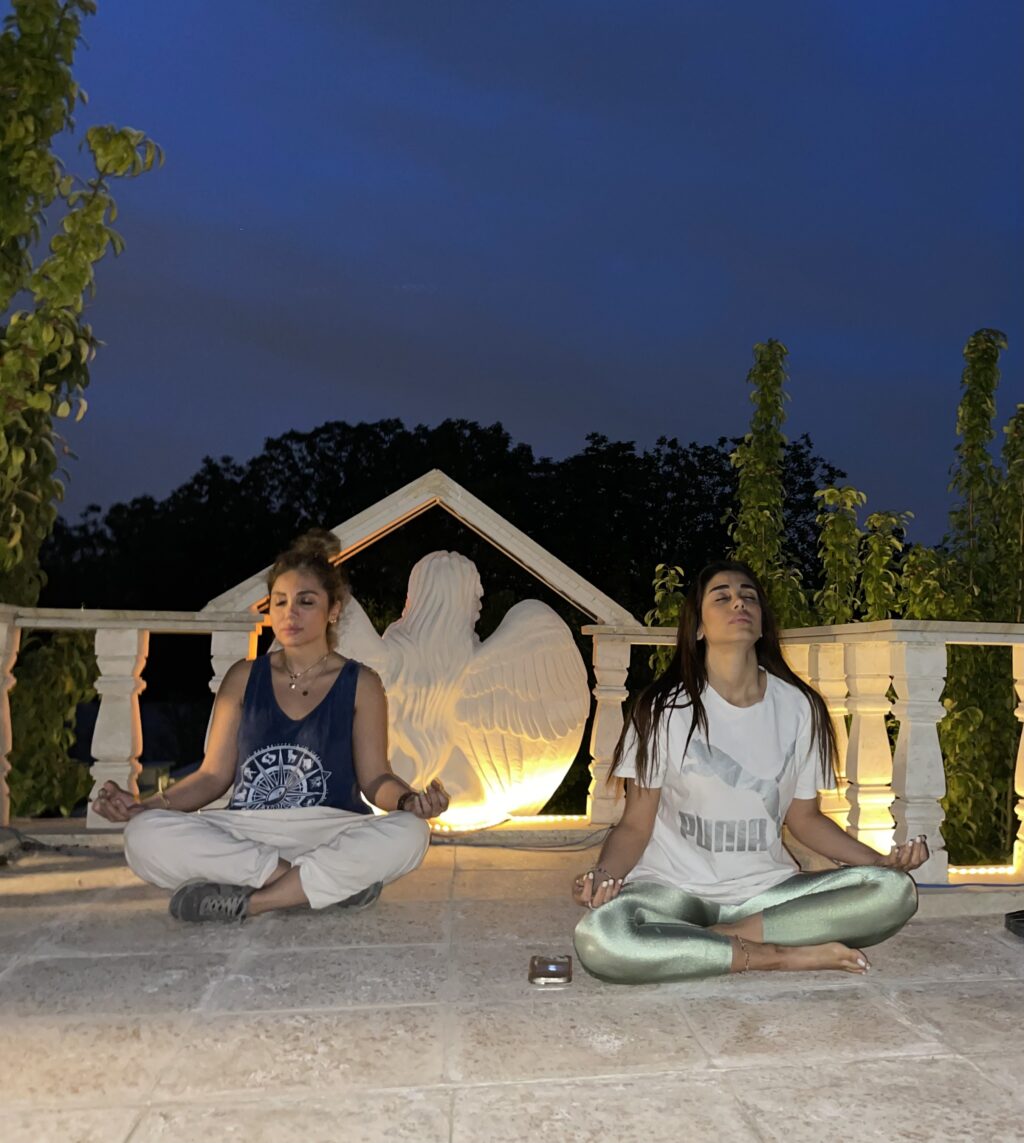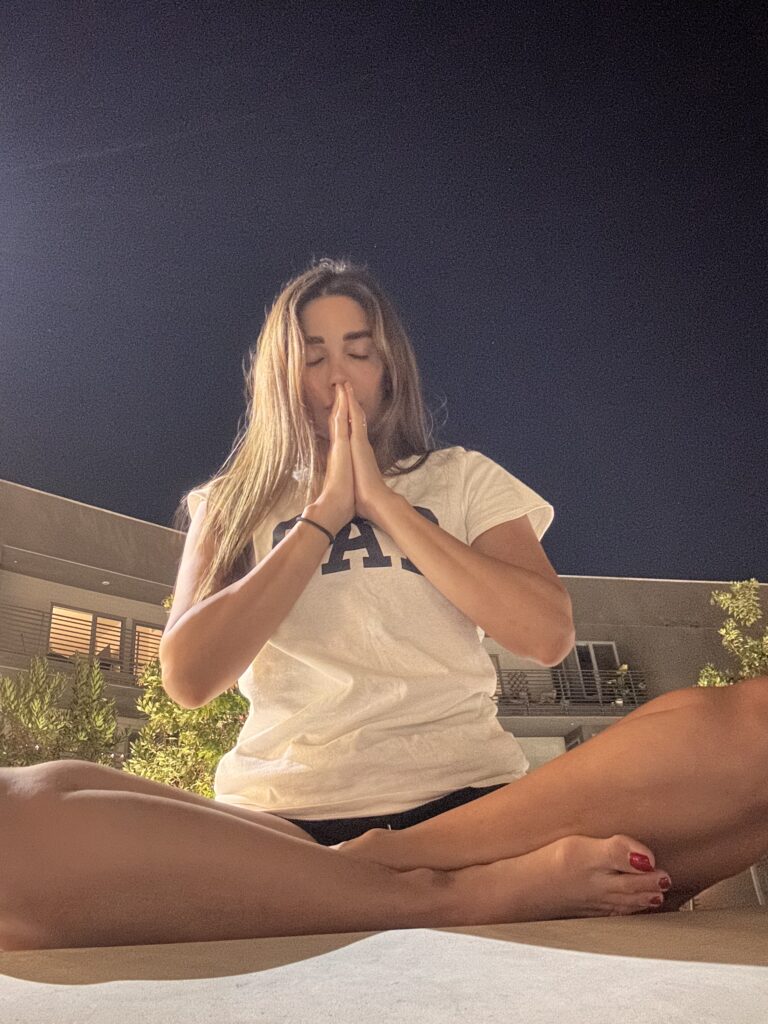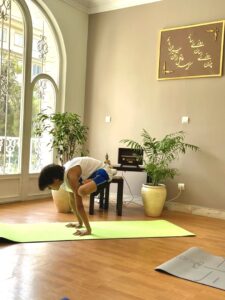
“After a busy day, your mind and body deserve a sanctuary of calm. Evening yoga rituals are more than just stretching – they are powerful practices that relax your muscles, release stress, and prepare your mind for deep, restorative sleep. By creating space for reflection and gratitude, these rituals transform your evenings into a journey of peace and inner balance.”
🌙
•The Power of Evening Yoga
Evening yoga connects body, mind, and breath. Gentle movements release the day’s tension, while mindful breathing soothes the nervous system and encourages relaxation.
•Better Sleep, Better Tomorrow
Practicing yoga in the evening helps your body slow down, reduces overthinking, and improves sleep quality – giving you energy and clarity for the next day.
•Gratitude and Reflection
Ending your day with gratitude and mindful poses fosters emotional balance and helps you let go of unnecessary stress.
⸻
📌 Call to Action (CTA)
“You don’t need hours – even 10–15 minutes of evening yoga can transform the way you feel at night and how you wake up in the morning. Try this evening ritual and experience the shift yourself
In the rush of daily life, finding moments of peace and introspection can be challenging. As the day winds
down, a structured evening yoga ritual can offer a sanctuary of calm and rejuvenation. This article explores
transformative evening yoga rituals, detailing practices that not only relax the body but also prepare the mind
for a restful night and a more mindful tomorrow.
The Importance of Evening Rituals
Evening rituals serve as a bridge between the activities of the day and the tranquility of the night. In the
context of yoga, these rituals can help release accumulated stress, soothe tired muscles, and center the mind.
This transition is crucial as it allows individuals to unwind and reflect, fostering a sense of gratitude and
completion.
Mind-Body Connection
Yoga’s emphasis on the mind-body connection is particularly beneficial in the evening. By focusing on breath and
movement, practitioners can enhance their awareness of physical sensations and mental states. This awareness
encourages the release of tension and helps cultivate a deeper connection with oneself.
Enhancing Sleep Quality
A consistent evening yoga practice has been shown to improve sleep quality by reducing insomnia and promoting
relaxation. Gentle poses and breathing techniques activate the parasympathetic nervous system, which helps
decrease heart rate and blood pressure, paving the way for restorative sleep.
Crafting Your Evening Yoga Ritual
Creating an effective evening yoga ritual involves selecting practices that align with your personal needs and
preferences. Here are some steps to help you design a ritual that works for you:
Set the Scene
Creating a peaceful environment is the first step in establishing a transformative evening yoga practice. Consider
dimming the lights, lighting candles, or using essential oils like lavender or chamomile to enhance relaxation.
A clean, comfortable space free of distractions sets the tone for introspection and mindfulness.
Choose the Right Poses
Select poses that promote relaxation and release tension. Forward bends, gentle twists, and restorative poses are
excellent choices. Here are a few poses to consider:
- Child’s Pose (Balasana): A restful pose that gently stretches the hips, thighs, andankles, while calming the mind.
- Legs-Up-The-Wall Pose (Viparita Karani): An inversion that promotes circulation andrelaxation, reducing anxiety and stress.
- Reclined Butterfly Pose (Supta Baddha Konasana): Opens the hips and chest, encouragesdeep breathing, and releases tension in the lower back.
- Seated Forward Bend (Paschimottanasana): Stretches the spine, shoulders, and hamstrings,promoting relaxation and flexibility.
Pranayama for Relaxation
Incorporating pranayama, or breath control, into your evening ritual can significantly enhance relaxation. Try
these techniques:
- Alternate Nostril Breathing (Nadi Shodhana): Balances the left and right hemispheres ofthe brain, promoting mental clarity and calmness.
- 4-7-8 Breathing: Inhale for a count of four, hold the breath for a count of seven, andexhale slowly for a count of eight. This technique is highly effective for reducing anxiety and preparing
the body for sleep.
Incorporating Meditation and Mindfulness
Meditation and mindfulness practices are essential components of an evening yoga ritual. These practices help
quiet the mind and cultivate a state of inner peace.
Guided Meditation
Consider integrating a guided meditation into your routine. Guided meditations can range from body scans to
visualizations, and they offer a structured way to focus the mind and release the tensions of the day. Numerous
resources are available online, from apps to free videos, catering to different preferences and experience
levels.
Gratitude Practice
Closing your yoga session with a gratitude practice can be profoundly transformative. Take a few moments to
reflect on three things you are grateful for, writing them down in a journal if you wish. This practice shifts
focus from daily stressors to positive aspects of life, fostering a sense of contentment and well-being.
Tips for Sustaining Your Evening Yoga Ritual
Consistency is key to reaping the full benefits of an evening yoga practice. Here are some tips to help you
maintain your routine:
Schedule Your Practice
Set aside a specific time each evening for your yoga ritual. Consistency helps establish a habit, making it more
likely that you’ll stick to your practice. Whether it’s 15 minutes or an hour, choose a duration that fits your
schedule and lifestyle.
Listen to Your Body
Your evening yoga practice should be a time of nourishment and self-care. Pay attention to how your body feels
each day, and adjust your practice accordingly. Some evenings may call for a more restorative routine, while
others might benefit from a more dynamic flow.
Embrace Flexibility
While consistency is important, it’s also crucial to remain flexible. Life can be unpredictable, and there will
be evenings when your usual routine isn’t feasible. On such days, a short meditation or a few deep breaths can
still offer significant benefits.
Conclusion
Transformative evening yoga rituals offer a powerful way to end the day with intention and mindfulness. By
crafting a routine that suits your individual needs, you can cultivate a sense of peace and relaxation that
extends beyond the mat. As you integrate these practices into your life, you’ll likely find enhanced well-being,
improved sleep, and a deeper connection to yourself. Embrace the journey, and let your evening yoga ritual be a
sanctuary of calm in a busy world.






